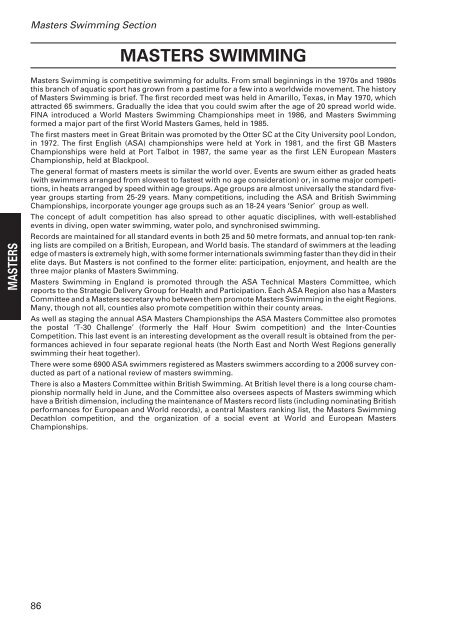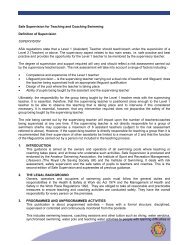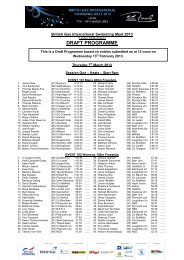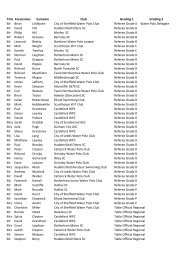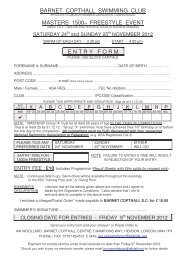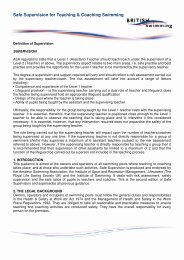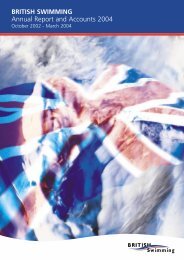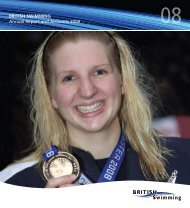The ASA Handbook - Swimming.Org
The ASA Handbook - Swimming.Org
The ASA Handbook - Swimming.Org
You also want an ePaper? Increase the reach of your titles
YUMPU automatically turns print PDFs into web optimized ePapers that Google loves.
Masters <strong>Swimming</strong> Section<br />
MASTERS SWIMMING<br />
MASTERS<br />
Masters <strong>Swimming</strong> is competitive swimming for adults. From small beginnings in the 1970s and 1980s<br />
this branch of aquatic sport has grown from a pastime for a few into a worldwide movement. <strong>The</strong> history<br />
of Masters <strong>Swimming</strong> is brief. <strong>The</strong> first recorded meet was held in Amarillo, Texas, in May 1970, which<br />
attracted 65 swimmers. Gradually the idea that you could swim after the age of 20 spread world wide.<br />
FINA introduced a World Masters <strong>Swimming</strong> Championships meet in 1986, and Masters <strong>Swimming</strong><br />
formed a major part of the first World Masters Games, held in 1985.<br />
<strong>The</strong> first masters meet in Great Britain was promoted by the Otter SC at the City University pool London,<br />
in 1972. <strong>The</strong> first English (<strong>ASA</strong>) championships were held at York in 1981, and the first GB Masters<br />
Championships were held at Port Talbot in 1987, the same year as the first LEN European Masters<br />
Championship, held at Blackpool.<br />
<strong>The</strong> general format of masters meets is similar the world over. Events are swum either as graded heats<br />
(with swimmers arranged from slowest to fastest with no age consideration) or, in some major competitions,<br />
in heats arranged by speed within age groups. Age groups are almost universally the standard fiveyear<br />
groups starting from 25-29 years. Many competitions, including the <strong>ASA</strong> and British <strong>Swimming</strong><br />
Championships, incorporate younger age groups such as an 18-24 years ‘Senior’ group as well.<br />
<strong>The</strong> concept of adult competition has also spread to other aquatic disciplines, with well-established<br />
events in diving, open water swimming, water polo, and synchronised swimming.<br />
Records are maintained for all standard events in both 25 and 50 metre formats, and annual top-ten ranking<br />
lists are compiled on a British, European, and World basis. <strong>The</strong> standard of swimmers at the leading<br />
edge of masters is extremely high, with some former internationals swimming faster than they did in their<br />
elite days. But Masters is not confined to the former elite: participation, enjoyment, and health are the<br />
three major planks of Masters <strong>Swimming</strong>.<br />
Masters <strong>Swimming</strong> in England is promoted through the <strong>ASA</strong> Technical Masters Committee, which<br />
reports to the Strategic Delivery Group for Health and Participation. Each <strong>ASA</strong> Region also has a Masters<br />
Committee and a Masters secretary who between them promote Masters <strong>Swimming</strong> in the eight Regions.<br />
Many, though not all, counties also promote competition within their county areas.<br />
As well as staging the annual <strong>ASA</strong> Masters Championships the <strong>ASA</strong> Masters Committee also promotes<br />
the postal ‘T-30 Challenge’ (formerly the Half Hour Swim competition) and the Inter-Counties<br />
Competition. This last event is an interesting development as the overall result is obtained from the performances<br />
achieved in four separate regional heats (the North East and North West Regions generally<br />
swimming their heat together).<br />
<strong>The</strong>re were some 6900 <strong>ASA</strong> swimmers registered as Masters swimmers according to a 2006 survey conducted<br />
as part of a national review of masters swimming.<br />
<strong>The</strong>re is also a Masters Committee within British <strong>Swimming</strong>. At British level there is a long course championship<br />
normally held in June, and the Committee also oversees aspects of Masters swimming which<br />
have a British dimension, including the maintenance of Masters record lists (including nominating British<br />
performances for European and World records), a central Masters ranking list, the Masters <strong>Swimming</strong><br />
Decathlon competition, and the organization of a social event at World and European Masters<br />
Championships.<br />
86


